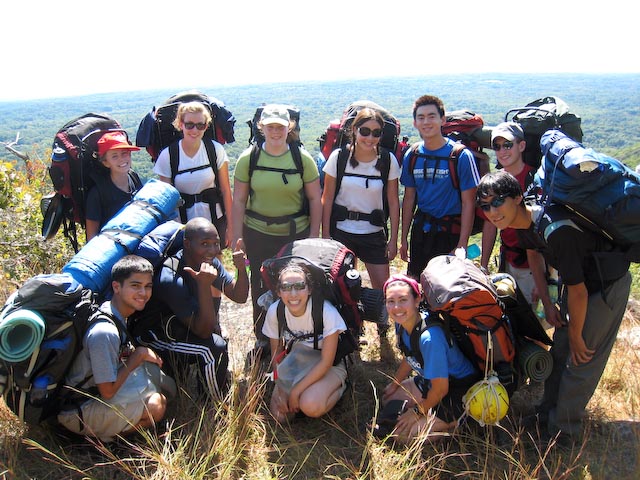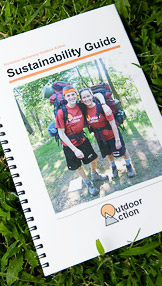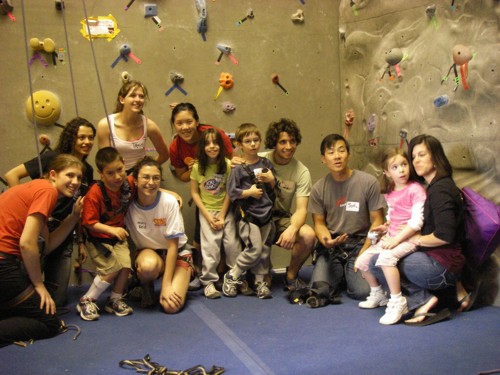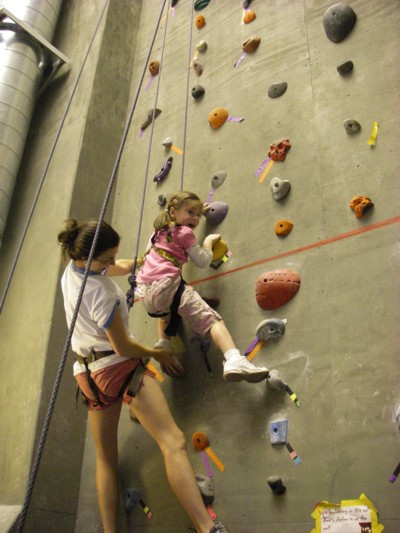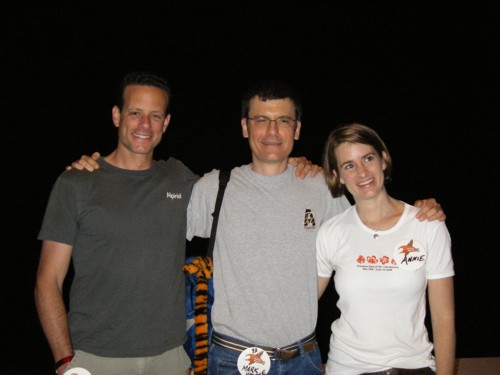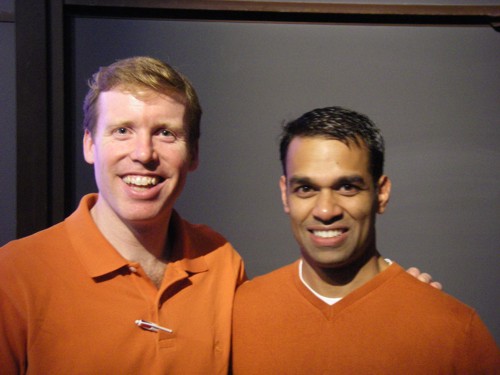Frosh Trip 2008 was our largest program ever with 688 freshmen (55 percent of the class) and 183 OA Leaders who went on 83 different trips up and down the east coast. Additionally, there were 54 student Support Team members and 10 Command Center student staff members, for a total of 940 students involved in this year’s program. This makes the OA Frosh Trip the largest single wilderness orientation program for freshmen in the entire country. Thanks to President Tilghman’s initiative to reschedule the international student preorientation, we had a total of 95 international students from 35 countries (13 percent of participating freshmen). This added an incredible diversity to the program and we’ve received very positive feedback from the students who participated. The increase in the number of international students required additional equipment like backpacks and sleeping bags that we were able to purchase thanks to special funding from the Provost’s Office and the Vice President for Campus Life. This is the second year that full financial aid has been provided to qualifying students, enabling their participation in the Frosh Trip. In previous years, when the trip fee was not fully covered by financial aid, the number of students applying for the program who were eligible for aid was about 45 percent, ten points below the aid percentage in the class. This year, of the total number of applications we received from financial aid students, 57 percent were eligible for financial aid as compared to 55 percent for the incoming class (including many of the international students). This increase indicates that because full aid is available, the cost of the trip, which previously was a disincentive for some financial aid students, is no longer a barrier to their participating. Thanks to a grant from the High Meadows Fund we were able to develop a new sustainability curriculum for OA Leaders and train them before the trips on techniques for integrating discussions on sustainability into the fabric of the OA Trips. It was extremely successful as you may have seen from the article “Training on trail may bring greener outlooks to campus” and the video on the University’s home page. Read more and check out the video at www.princeton.edu/~oa/sustainability/. We will continue to develop the OA sustainability initiative this year. |
What OA has accomplished in terms of student growth and development over the past thirty-five years is simply astounding and it could not have happened without the financial support of so many OA Alumni and parents. Last year more than 400 of you answered my challenge of supporting OA through your membership dues and gifts. Thank you for giving back to OA and, more importantly, for taking the lessons that you learned through OA and giving them back in your community. Rick Curtis ’79 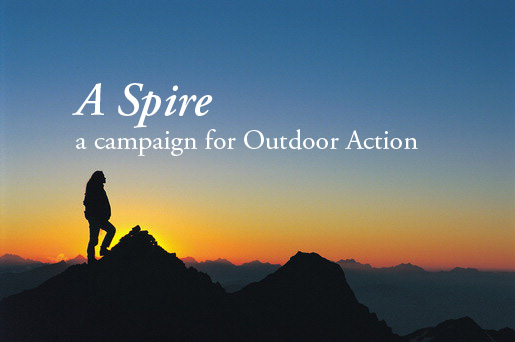
The Outdoor Action “A Spire” campaign is part of the University’s Aspire capital campaign. In mountaineering a spire is a tall and narrow rock formation, resembling a steeple. Our goal in reaching the top of the spire is to build an endowment for OA to fund the leader training program and other leadership development activities on campus, trip programs during the year, and support new programs like the OA Sustainability Initiative and OA community service programs. How are endowment funds different from my annual Friends of OA dues?Since 80 pecent of OA’s budget comes from student fees your annual Friends of OA membership dues, like the University's Annual Giving program, goes into this year’s budget to help us fund annual program operations. Last year your dues helped provide scholarships for over thirty students to participate in Leader Training, helped fund the Climbing Wall, and support OA trips during the academic year. Why are endowment funds so important?A top priority of the University’s Aspire campaign is to make the highly successful OA program available to a wider range of Princeton students and community members and to enhance its capacity for training student leaders. Funds are currently being sought to underwrite leadership training courses that student volunteers now have to pay for themselves, to endow academic-year activities to make them more affordable, and to support the programs associated with the climbing wall. For more information on gifts to Outdoor Action, contact OA Director, Rick Curtis (rcurtis at princeton) or Laurie Russen in the Development Office (lrussen at princeton). |
OA Leaders Reflect |
||
Lucy Guarnera ’09
|
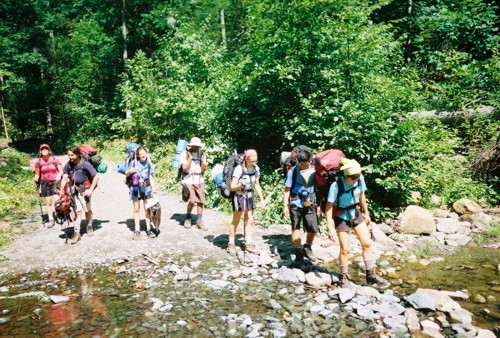 |
I signed up for Frosh Trip as in incoming freshman because I wanted to meet some fellow ’09ers before starting school. I was much less stressed about starting college because when my parents said goodbye, I was looking at a week of camping rather than facing the campus jungle right away. My leaders were kind and energetic upperclassmen who answered all my questions about Princeton, even questions I didn’t know I had. Also, Frosh Trip gave me a sort of tangible confidence born from knowing I had successfully hiked over 30 miles with 30+ pounds on my back, even though it was sometimes so physically difficult all I wanted to do was sit down.
When I purchased my hiking boots for Frosh Trip, my mother asked me if I would ever use them again, and I responded, “Probably not.” Since then, however, my boots have been scuffed, muddied, relaced, and restitched more times than I can count. I liked Frosh Trip so much I decided to train to be an OA leader, easily the best decision I ever made at Princeton. Although the leader training classes in first aid, campcraft skills, and group dynamics were useful, no classes could have fully prepared me for the challenging, tiring, and completely amazing experience of leading my first Frosh Trip. Few other activities at Princeton offer this kind of leadership experience. While I was hiking along the Appalachian Trail on my own Frosh Trip, worried about nothing more the ache in my feet and the conversation with the person in front of me, I had no idea all the things my OA leader was doing: looking forward to make sure we were on the right trail; looking backward to make sure the group was together; checking for landmarks to calculate where we were on the day’s route; thinking about how fast we had to hike to make it to camp before dark; deciding when the next water break should be; monitoring the group morale and cohesion; belting out songs and games to keep the group motivated—and all this on less sleep than the freshmen, since OA leaders go to sleep later and wake up earlier than the group to prepare for the next day. This is real leadership, and, thanks to OA, I am now a real leader.
~ Lucy Guarnera, a senior from Hillside, NJ was a Frosh Trip Coordinator during the summer of 2007. She is a Leader Trainer and a HEART Wilderness First Aid Instructor.
Liz Dilday ’09
For most Southern Californians, “the great outdoors” evokes images of beaches and bike paths in the summertime. Needless to say, upon my arrival at Princeton in September 2005, I was unaware of what my “Level 4” Outdoor Action trip—a week of backpacking in the Catskills—would entail. Faced with a campus that seemed impossible to navigate, a tearful goodbye to family members, a new roommate, and a less-than-cozy double in the old Butler College, I second-guessed my preparedness for an Ivy League institution.
Meeting my group C19 quickly changed my worries into excitement. My trio of leaders offered advice that was enthusiastic, candid, diverse, and invaluable. With lots of strenuous physical activity and no showers, bathrooms, or deodorant, we became comfortable with discomfort—certainly a metaphor for starting college. Through an OA activity appropriately named “Fears in a Hat,” my leaders answered our difficult questions and reassured us that we were ready for university life. After C19, with ten new close friends, I thought, “How can I not do this for the next three years?” and became an OA Leader.
Though the impressions and anecdotes may seem insignificant, I have come to realize as a frosh-turned-leader that these little things continued to guide me long after the week in the woods ended. Over the three Frosh Trips I have led, I have found that nearly every freshman thinks that he or she must drink to fit into Princeton culture. My leaders were careful to relate to us that there is no “right” or “wrong,” “cool” or “uncool” approach to life on campus, which is what I in turn have ventured to explain to my frosh. Casual discussions while bear-bagging or snacking on GORP give a more balanced perspective on campus social life and highlight the array of social options on campus. I have meanwhile encouraged each of my frosh to make informed decisions and move at his or her respective pace.
Outdoor Action sparked my persistent interest in alcohol-related issues. The “soft skills” that we practice so thoroughly in OA Leader Training have helped me with my work on the University’s Alcohol Coalition Committee (ACC). With the aid of other students and administrators I have continued to encourage health, responsibility, and independent-thinking by raising awareness of high-risk drinking through campus workshops, seminars, and the implementation of sustainable working groups on education, policy, and structures and activities.
OA has molded me into a more open-minded leader, which has spilled over into endeavors like the ACC and water polo. My friends from each of my Outdoor Action experiences are prominent and irreplaceable pieces of the pie of my Princeton life, and however small the “orange bubble” seems at times, I am grateful to have known these people whose “trails” I otherwise might never have crossed.
~ Liz Dilday, a senior from Long Beach, CA, has led three Frosh Trips.
OA Sustainability Initiative brings greener outlook to campusOA incorporated sustainability into the Frosh Trip, focusing on trash reduction, food choices, recycling, etc. Here is what frosh had to say: It’s so great to realize that I can fend for myself out here and I love that we aren’t generating very much trash. I love that I’m not driving my car around. We’ve actually been talking a lot about sustainability. OA trips in the past have been focused just on packing out the trash. We wouldn’t leave it in the wilderness, we’d just put it in a dumpster back at school. On this trip we are trying to not generate that trash in the first place. Having seen how much transportation goes into packaging and processing food I’m going to be a lot more careful in my own life. This just really puts everything in perspective. I know I’m going to appreciate everything much more when I get back to school. - Julia Rees ’12 from Bethesda, MD I really didn’t know much about living in the woods without impacting the environment. I didn’t really know about how to reduce trash and things like that. This has really opened my eyes about how much impact we have on the environment. Going back home I know I'm going to not drive my car so much and I’ll use more natural transportation, like walking or biking. And I’ll definitely recycle more. - George Che ’12 from Malden, MA Find out more about the OA Sustainability Initiative at: www.princeton.edu/~oa/sustainability/
|
Climbing & Kids: What Service Means |
|||
Peak Potential was started in 2000 by Dr. Jen Fu Cheng ’93 when he was a resident at a pediatric rehabilitation facility. Jen Fu, a former OA Leader and Climbing Wall staff member, was an avid climber and wanted to merge his love of the sport with his vocation of serving children with disabilities. Neurological, muscular, and developmental disorders such as cerebral palsy and muscular dystrophy affect thousands of children each year and the emphasis too often has focused on the limitations caused by these conditions. Because of these misperceptions, many activities, especially outdoor adventure activities have traditionally been inaccessible to these children. Jen Fu singlehandedly started Peak Potential in an effort to expand the variety of experiences available to children with physical challenges. With the use of a harness and a belay system, children are able to use all four extremities to propel themselves up a wall, and those who may have a deficit in one or more extremities are able to participate and excel.
A new partnership between Outdoor Action and Peak Potential has created Peak Potential Princeton—a weekly community service program where Princeton students mentor children with disabilities at the new OA Climbing Wall. “The most rewarding experience I’ve had with Peak Potential has been watching the immense improvement in the kids, both in their abilities and confidence as climbers. It is incredible to see how quickly volunteers and the children form close bonds. Even something as simple as a little encouragement can help create powerful feelings of optimism in the kids. In our last session, a little girl named Olivia came to the OA Wall with her entire family. She climbed twice and on her second try she managed to double her progress up the wall, smiling and waving to her baby sister the whole time. After working with Olivia, I realized that climbing isn’t just a fun activity or a new experience. For these kids, climbing is a way of challenging the conceptions of their limitations and achieving something truly inspiring for themselves and the people around them.” You can see more photos and video of Peak Potential Princeton in action at: www.princeton.edu/~oa/service/. - Tracy Walsh, a junior from Fuquay Varina, NC, is co-coordinator of Peak Potential Princeton
|
Community Service is just one of the innovative new programs at the Climbing Wall. We are using the Wall for experiential education and team building for numerous campus groups. OA sponsored a women’s only climbing event for Orthodox Jewish Women from the Center for Jewish life and Muslim women from the Muslim Students Association—two populations who cannot participate in activities like this with men present. Marni Blitz from the Center for Jewish Life said, “It was a truly remarkable experience for all involved! It was wonderful to watch the girls all bond together, with no hesitations, no inhibitions and no pretense. The girls were all supportive of each other, and all expressed an interest in making this a regular event.” One of the female Climbing Wall staff who worked the event said, “It was the first time I’ve ever been able to actually talk with a woman that wears a veil. I assumed that she would be much different than me; once she took off her veil and started climbing, I realized that we were not so different after all. It was a really eye-opening and very positive experience for me.” Along with programs like this OA is doing team building programs for RA groups at the Residential Colleges, varsity sports teams, and we’ve received funding from the University Alcohol Initiative to have the Climbing Wall open for free on Thursday nights from 10:00 p.m. to 1:00 a.m. as an alcohol free social alternative. With a fantastic facility like the Climbing Wall, there are no limits to what we can do. Find out about how you can help support the many new programs at the Climbing Wall.
|
||
Watch Peak Potential Princeton in Action
Jess Lander '10 and Ronnie |
|||
Support the OA Climbing Program through the Joe Palmer ’84 Memorial FundFor the first twenty-five years of the OA Climbing Wall, students paid to use the facility in order to offset the costs of equipment and to cover the wages of the student Climbing Wall Staff. During the spring of 2008 we received a one-time grant through Janet Dickerson, Vice President for Campus Life, to allow the Wall to be free for all students. Thanks to that support the number of students using the Wall doubled in one semester and we continue to operate the Wall free for undergraduates and graduate students. Joe Palmer ’84 was one of the keystones of OA’s climbing program in the eighties and helped to build the first climbing wall in 1983. He died in a climbing accident in Yosemite in 1985. A number Joe’s friends in the Class of ’84 and Joe’s family have instituted a special fund in memory of Joe to support the climbing program at Princeton. Our long term goal is to build an endowed fund in Joe’s name to generate $25,000 in annual funds to ensure that this wonderful resource remains free to all students and to support new initiatives like Peak Potential Princeton. Please visit the new Wall on your next trip to campus and watch for our special Wall events at Alumni Day and Reunions. For more information and photos of the new Wall go to www.princeton.edu/~oa/climb and for information on how to make a donation to the Joe Palmer ’84 Fund contact OA Director, Rick Curtis (rcurtis at princeton or Laurie Russen in the Development Office (lrussen at princeton) |
Alumni News & Notes |
|||
Mountaineering a “High Point” at ReunionsPeople who were on campus for Reunions had the unique opportunity to hear from several mountaineering alumni. As both a physician and climber, Dr. Robert “Brownie” Schoene ’68 has climbed all over the world and has completed extensive research on adaptation to and illness at high altitudes both in climbers and in people who live at high altitudes. He recently coauthored an authoritative text on High Altitude Medicine and Physiology. Brownie’s presentation focused on his adventures, research, and joys at high altitude.
In June 1993, a group of Outdoor Action leaders (Alex Friedman ’93, Mark Haefele ’93, Anne Howell ’93, Jess Mosblech ’93, David Plumb ’95, Helena Taylor ’95 and Felipe Valdes-Arrieta ’93) climbed Mount McKinley in Alaska to raise money and awareness about AIDS for The American Foundation for AIDS Research. Five years later a group of women climbers from Outdoor Action (Majka Burhardt ’99, Bethany Coates ’98, Naomi Darling ’96, Katie Gamble ’98, and Meg Smith ’98) did a summit assault of the West Buttress of Mount McKinley with a group of breast cancer survivors to raise money for The Breast Cancer Fund. Members of both expedition groups came together for the first time to share experiences of their climbs. Josh Miner ’43 Award WinnersThis years’ Josh Miner ’43 Experiential Education award was presented at Reunions to Raj Vinnakota ’93 and Temp Keller ’98. The award is given annually to “a graduate of Princeton University who has provided outstanding leadership in the fields of experiential or outdoor education.” Rajiv Vinnakota is co-founder and managing director of The SEED Foundation, a national nonprofit that establishes urban public boarding schools to prepare students from underserved communities for success in college. Temp Keller is the Founder and President of RISE (Resources for Indispensable Schools and Educators), an award winning non-profit organization that exists to retain effective teachers in public schools serving low-income communities. RISE currently works with more than 100 schools and 2,500 teachers between the San Francisco Bay Area, Los Angeles, and Chicago. Both award winners spoke eloquently about the challenges faced by public schools in urban areas and how their foundations have created positive solutions for urban youth
|
Notes from the TrailheadSend us your latest stories on the enclosed membership form. David Irving ’58 and his wife Barb, along with grandson, Shane (age 11), and daughter, Carol, hiked down the Kaibab Trail in the Grand Canyon. They crossed the Colorado River and spent the night in bunk houses at the fabled Phantom Ranch. The next day they trekked the Bright Angel Trail back to the rim. Dr. Marvin Swartz ’63 climbed Mt. Whitney (CA) in a day this past summer and led hikes for the AMC in the Sierra Nevada Mountains of CA and the White Mountains of NH. Robert Schoene, M.D.’68 published a book on high altitude last winter—the latest definitive text. Dr. Anne Helsley-Marchbanks ’80 spent 10 days paddling in the Boundary Waters, MN, over the summer. “This year it will be the Colorado Rockies.” Mary E. Newman ’83 states that as an architect she is “splitting my work time between sustainable design in Portland, ME, and the transformation of a royal palace complex in the Kathmandu Valley in Nepal, into a national museum.” Andrew Reumann-Moore ’83 climbed “first 14er this summer with my brother, Tom, at Quandary Peak, CO.” Dean Buchenauer, Ph.D. ’85 attended Philmont Scout Ranch this past summer with his son. “We enjoyed a 70-mile backpack over 11 days, including rock climbing, gold panning, and black powder shooting.” Dr. Susan Mariscal Glockner ’85 states “We hiked the Inca Trail with our kids (Katie, 13 years, and Billy, 11 years) and went to the Galapagos last summer. The previous summer we introduced them to backpacking in the Sierras.” Jonathan Taylor ’86 and Andi Suess Taylor ’88 moved to Sarasota, FL, where they hope to sail and sea kayak with their boys Noah (age 12) and Jacob (age 9). Pieter van Zee ’87 & Kari Lister van Zee ’87 report that daughter Erynne van Zee (almost 13 years) is an avid backpacker thanks to OA’s training of her parents. “She thinks nothing of toting a 40 lb. pack for five days in the Opal Creek Wilderness in Oregon.” Alex Meyer ’92 and Heather Wakelee, M.D. ’92 started their girls off to an early start of wilderness appreciation. “Azalea hiked 3 miles in the Canadian Rockies the day before her 4th birthday. Zora, at age 1-1/2 served as a good bear warning system by screaming the entire time, though.” Mark Wiranowski ’95 and Melissa Lockman ’97 reported that Mark was seriously injured while descending from a climb at Lumpy Ridge in Rocky Mountain National Park, CO, in August 2007. Fortunately, the ensuing surgeries went well and Mark did not lose his leg. For details about the accident and Mark’s condition, visit www.rockthehealing.blogspot.com. For more Notes from the Trailhead go to www.princeton.edu/~oa/alumni/ttrails/trailhead.shtml. |
||

